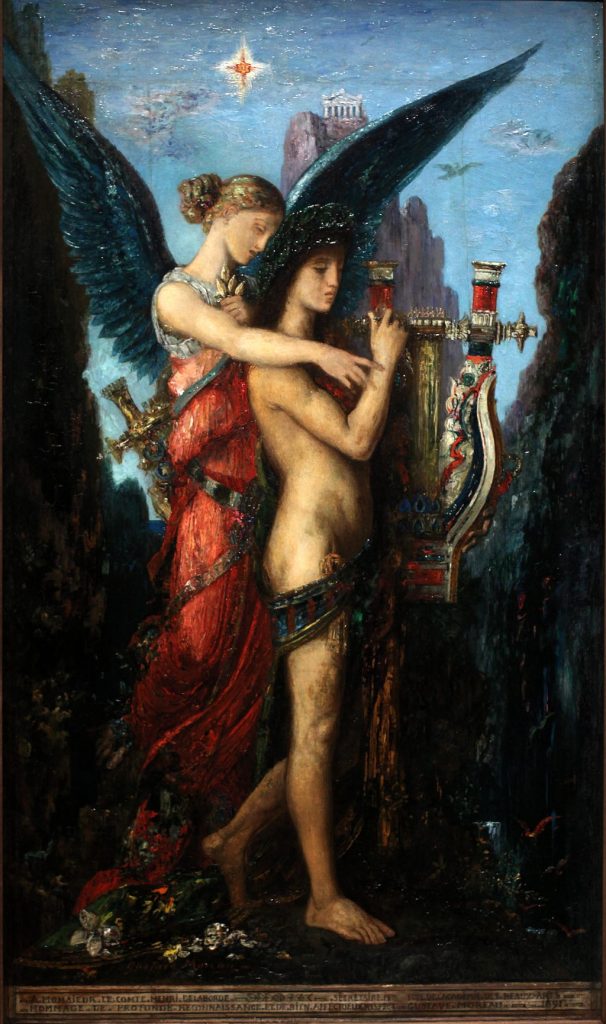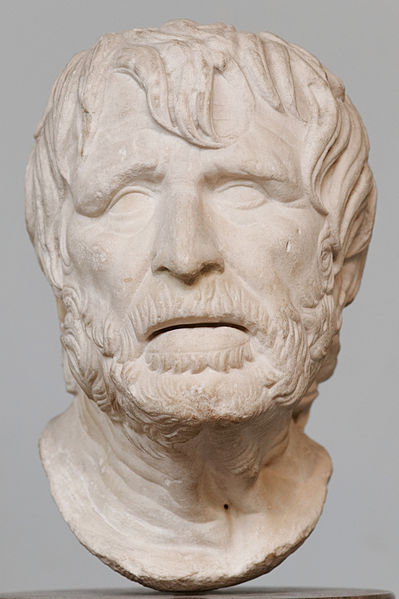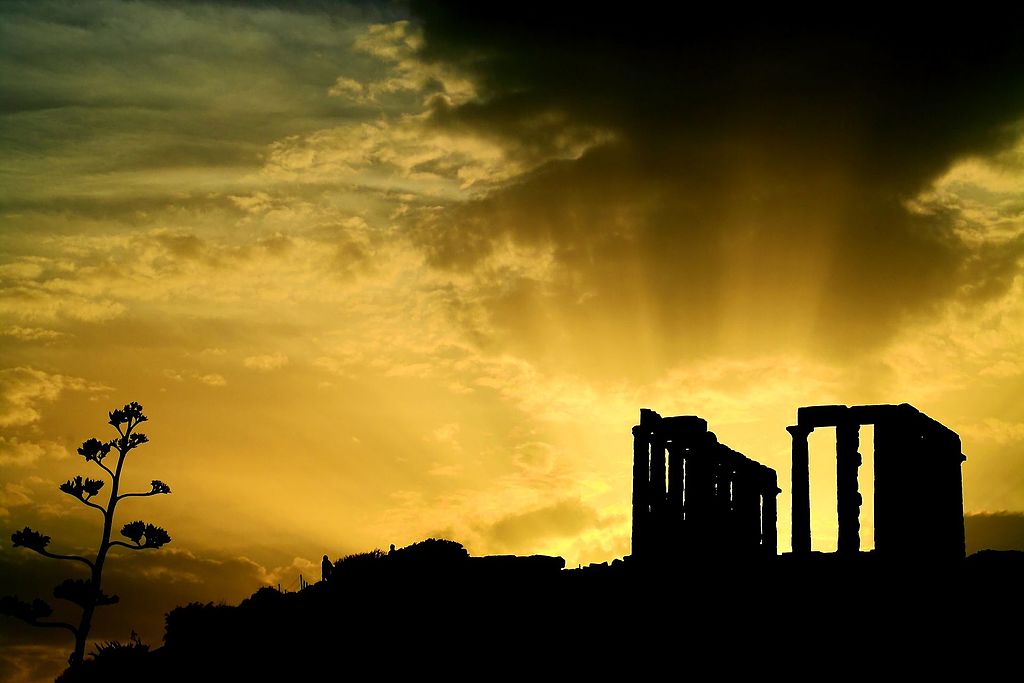In his epic poem, Works and Days, the great poet Hesiod wrote of the Five Ages of Man. Each more degenerate than the last (with one exception), Hesiod documented humanity’s slow descent from perfection in the Golden Age to the deplorable evils of the Iron Age. It is a tale of caution for the current generation and of longing for a bygone era of prosperity and harmony.

Who is Hesiod, the author of the Five Ages of Man?

One of the greatest Greek poets, Hesiod is thought to have lived between 750-650 BCE. He is often referred to as the “father of didactic poetry” and credited (alongside Homer) with establishing religious customs and order in ancient Greece. A farmer by trade, Hesiod lived in the shadow of Mount Helicon in a town called Ascra. It was on Mount Helicon that he, according to legend, had an encounter that would change his life forever.
While attending his sheep on the mountain slopes, Hesiod was visited by the nine Muses – the goddesses of inspiration. They presented to Hesiod a staff made from the laurel tree, a symbol of his new poetic authority, and bade him to “sing of the race of the blessed gods immortal.” A pious man, Hesiod heeded their command and penned the Theogony, a poem that chronicles the birth of the gods and sets the Greek cosmos in order. His second major poem, Works and Days, details the importance of honesty, hard work, and devotion to the gods. It is also where we find Hesiod’s account of the Five Ages of Man.

The Golden Age
According to Hesiod, the first age of man was an era of gold. Gold is pure, beautiful, and extremely valuable. In it, Hesiod saw the same perfection he saw in the earliest moments of humanity. These blessed people had been created by Cronus, father of Zeus, and lived without worry or toil in an eternal springtime. The earth brought forth enough produce on its own that no one ever needed to work in the hot fields or worry that they would not have enough food to provide for their families.
The people of the Golden Age never experienced sorrow of any sort. Their lives were filled with happiness and peace. And though their lives were long, when death finally came for them, it was as if they’d simply fell asleep. No heartache or mourning accompanied their passing for they became daimones, benevolent spirits that guide and protect mortals. The Golden Age was beyond compare, perfect in every way. But it did not last.
The Silver Age
Silver, like gold, is a precious and rare metal. But its color is not as rich, its luster not as shiny, as that of gold. With the dawning of the Silver Age, Hesiod saw a diminishing of men. These mortals were created by the thunder god Zeus after he had disposed of his father, Cronus. Cronus had gifted the men of the Golden Age with the physical beauty and wisdom of the immortals. But Zeus saw this as a threat to the sovereignty of the Olympian gods.
The people of the Silver Age were inferior in every way. For 100 years they lived as children under the care of their mothers. When adulthood finally came, it was brief and filled with hardships unknown in the previous age. The earth no longer provided its bounty willingly. Zeus divided the year into four seasons, and men were forced to work the fields for the first time. Perhaps it was because of this that the people turned against the gods. For their impiety, Zeus destroyed them, bringing an end to the Silver Age.
The Bronze Age in the Five Ages of Man
After the destruction of the Silver Age, Zeus created a new race of men, crafting them from the wood of the ash tree. Ash is a hard, durable wood used in the construction of spears. It is a wood of war and destruction, and so too were the people of the Bronze Age. The men of this era made both their armor and homes from bronze. They were a fierce and warlike people whose diet primarily consisted of the meat they hunted.
Strife and turmoil were hallmarks of the Silver Age until finally, outraged by their ferocity, Zeus sent a great flood to rid the earth of their barbarity. While the mortals of the Golden Age had become daimones in death, and those of the Silver Age had been allowed to become blessed spirits in the Underworld, men of the Bronze Age left behind no special spirits. Upon death, they became unnamed phantoms lurking in the dark of Hades.
The Heroic Age
The Age of Heroes is the one shining exception in Hesiod’s Five Ages of Man. For Hesiod, this age was based on historical fact. (In modern times, we know this era as the time of the Myceneans.) This was the age of men that Homer wrote of, full of mighty warriors who fought for justice and died in the legendary wars of the ancient past. This age was teeming with bravery and heroic deeds that would echo throughout eternity. Demigods, the children of mortals and immortals, walked the earth. The gods were held in their rightful esteem and gave their blessings to the worthy.
Upon their deaths, the souls of the Heroic Age went to the Islands of the Blessed to spend their eternity in paradise. Hesiod longed for the return of the courage and piety of the Heroic Age. In his mind, the Heroic Age was as close as humanity would ever come to reclaiming the perfection of the Golden Age. Unfortunately, by the time Hesiod penned his story of the Five Ages of Man, the Heroic Age was no more than a memory.
The Iron Age
With the end of the Heroic Age came the final era of Iron. This was the time that Hesiod himself lived in. Hesiod lamented, “Would that I had died before or been born later! For now truly is a race of iron: there is no end to toil and misery by day, nor to perishing by night.” Iron Age men were spiteful, dishonest, and quarrelsome. Men used shameful tactics to persevere, not their own courage and wisdom like the men of the Heroic Age. Sorrow and injustice reigned over these mortals. The gods that had once lived on earth abandoned it, fleeing the horrors of humanity to take refuge in Olympus. Pain and suffering filled every moment.
Hesiod grieved for the Heroic Age, longing for a return to piety and grace. But no matter where he looked, he saw only destruction and hardship in the world around him. Hesiod lived in a time when Greece was just beginning to emerge from what has been called the Dark Ages. The legendary heroics of the Myceneans were a distant memory, and it would be many years before the might of the city-states restored Greece to its former glory. And though there were remarkable moments and the echoes of laughter in even the darkest of ages, Hesiod could not see them. Or if he did, he did not write of them.
Today, according to Hesiod, we still live in the Iron Age of Man. Hesiod prophesied that the state of the world would continue to degrade until finally Zeus destroys this age as well. Just as Hesiod did, we often find ourselves looking back, recalling the semi-mythical “good old days” and longing to return to a time all but forgotten. Perhaps someday the Iron Age of Man will end as well. Or maybe we will escape the fate Hesiod foresaw and create a new age, a better age. Only time will tell.
If you are enjoying my articles on Historyen, please consider joining me on Facebook at Laurie Martin-Gardner, Author & Artisan or visit my website at www.lauriemartingardner.com.


Many thanks to you for sharing these wonderful content. In addition, the right travel and also medical insurance approach can often ease those considerations that come with touring abroad. Your medical crisis can soon become too expensive and that’s sure to quickly impose a financial impediment on the family finances. Setting up in place the best travel insurance package prior to setting off is definitely worth the time and effort. Thank you
It?s really a nice and useful piece of information. I am glad that you shared this helpful information with us. Please keep us informed like this. Thank you for sharing.
magnificent points altogether, you just gained a new reader. What would you suggest about your post that you made a few days ago? Any positive?
I am not sure where you’re getting your information, but good topic. I needs to spend some time learning more or understanding more. Thanks for great info I was looking for this info for my mission.